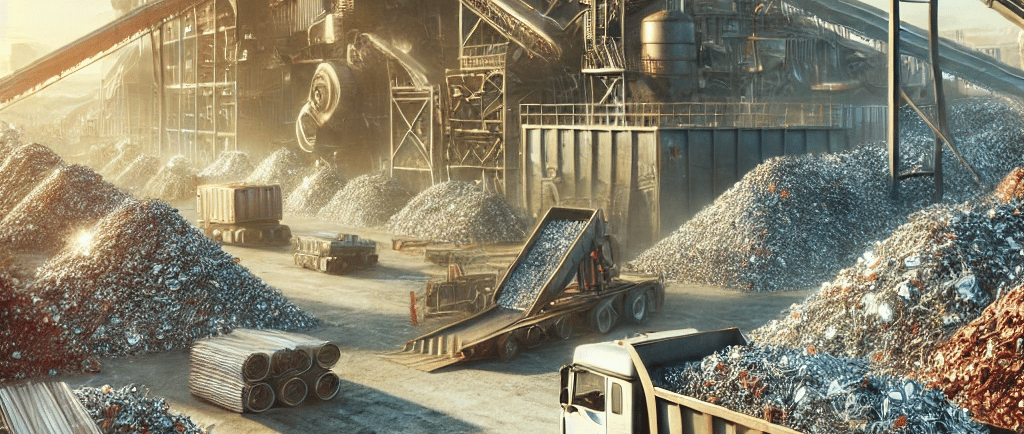Government Policies and Incentives Driving Scrap Metal Recycling
Discover how government policies, EPR mandates, and recycling incentives shape the scrap metal market. Learn key regulations, financial benefits, and trade strategies for sustainable business growth
SUSTAINABLE METALS & RECYCLING INNOVATIONS


Scrap metal recycling plays a critical role in sustainable development by preserving natural resources, reducing energy consumption, and minimizing landfill waste. Governments worldwide are actively promoting recycling through policies such as Extended Producer Responsibility (EPR), subsidies, and trade regulations. These initiatives support a circular economy, ensuring metals are reused efficiently rather than discarded.
In this blog, we’ll analyze the key policies shaping the industry and explore how businesses can navigate regulatory changes to enhance sustainability and profitability.
Main Takeaways from Government Recycling Policies
Government interventions ensure scrap metal recycling remains financially feasible and environmentally sound. Key policies shaping the industry include:
Extended Producer Responsibility (EPR): Shifts recycling responsibility to manufacturers of metal-based products, reducing waste and encouraging recyclable designs.
Subsidies and Tax Incentives: Many governments provide financial assistance to companies investing in recycling technologies or using recycled metals.
Import and Export Regulations: Stringent trade policies influence global scrap flow, ensuring environmental compliance and resource security.
Mandatory Recycling Targets: Recycling quotas push industries to improve waste recovery rates, fostering a more circular economy.
Each of these policies impacts cost structures and operational strategies for recyclers, manufacturers, and traders alike.
Key Government Policies Enhancing Scrap Metal Recycling
Extended Producer Responsibility (EPR)
EPR policies hold manufacturers accountable for the life cycle of their products, compelling them to establish recycling systems or finance recycling costs. Nations leading in EPR implementation include:
European Union: Strong EPR frameworks for e-waste, batteries, and industrial metals.
China: Circular Economy Promotion Law mandates producers to manage end-of-life materials.
Canada: British Columbia enforces EPR for metal containers and appliances.
With EPR adoption increasing, businesses should explore partnerships with recyclers to ensure compliance and future-proof their operations.
Financial Incentives for Recycling Businesses
Governments worldwide offer financial incentives to encourage more companies to integrate recycled materials:
United States: The Recycling Investment Tax Credit helps businesses reduce costs for purchasing recycling equipment.
Germany: Supports industries using recycled metals through subsidies.
India: Financial aid and grants through the Metal Recycling Policy.
Sweden: Grants for innovation in automated waste sorting and AI-driven recycling.
By leveraging available subsidies, businesses can lower capital expenditures on recycling infrastructure and enhance sustainability commitments.
Global Trade Regulations on Scrap Metal
Nations enforce strict controls over the export and import of scrap metal to reduce environmental risks and promote domestic recycling. Notable regulations include:
China’s National Sword Policy: Restricts scrap metal imports to enhance local recycling quality.
EU’s Basel Convention Compliance: Limits hazardous waste exports to developing countries.
USMCA Agreement: Encourages sustainable scrap metal trade across North America.
For businesses, adapting to these regulatory shifts is crucial to maintaining smooth supply chains and avoiding financial penalties.
Mandatory Recycling Targets and Circular Economy Strategies
Countries are implementing recycling targets to improve waste recovery rates and reduce metal production dependency:
European Green Deal: Strengthens recycling mandates for metals across sectors.
Japan’s Home Appliance Recycling Law: Requires metal recovery from manufactured electronics.
California’s Metal Shredding Regulations: Enforces compliance for metal recyclers.
With strict recycling benchmarks in place, manufacturers and recyclers should invest in enhanced metal recovery technologies to maintain competitiveness.
Actionable Recommendations for Businesses
To stay competitive and compliant in a changing regulatory landscape, scrap metal businesses should consider the following strategies:
Monitor Global EPR Developments: Businesses producing metal-containing products should track EPR expansions and adjust recycling processes accordingly.
Leverage Recycling Incentives: Apply for tax credits, grants, and subsidies to lower operational costs and improve sustainability.
Adapt to Trade Regulation Changes: Stay ahead of import/export restrictions by strengthening local recycling capacity.
Invest in Advanced Recycling Technologies: AI-driven sorting systems and automated material recovery will enhance compliance with stricter laws.
Diversify Supply Chains: Reducing reliance on international scrap imports by building regional partnerships can mitigate disruptions.
Navigating Policy-Driven Market Shifts
Government regulations are reshaping the scrap metal industry, making sustainability a core focus for manufacturers, recyclers, and traders. Policies such as EPR, financial incentives, and recycling mandates are driving a transition toward a circular economy.
Businesses that stay informed and proactive in adapting to these regulations will gain a competitive advantage.
Strategic investments in recycling processes can lower operational costs and ensure compliance.
Global supply chain adjustments will be essential to navigate trade restrictions effectively.
By keeping a pulse on regulatory developments, scrap metal stakeholders can align their operations with evolving laws while maintaining profitability and environmental responsibility.
